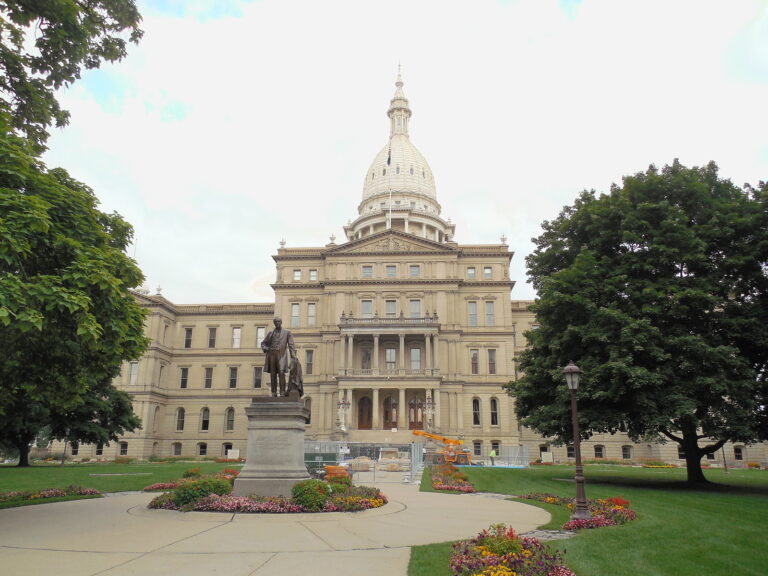Several weeks ago the Michigan Public Service Commission (MPSC) issued a disappointing order that, for the most part, ignored the reforms proposed by the Citizens Utility Board (CUB) of Michigan and other groups and did not hold the state’s utilities accountable for increasingly frequent power outages. Read our blog post here and our initial statement for the full background on that decision.
We ended that blog post by saying: “CUB is not done fighting for a fairer approach to consumers who lose power. Stay tuned.”
We can now announce the next step in this fight: on April 13, state Reps. Abraham Aiyash (D-Hamtramck) and Yousef Rabhi (D-Ann Arbor) introduced a package of legislation that would enshrine into law consumer protections that help all Michigan residents cope with the dangers, costs and inconveniences that come with frequent power outages.
“Reps. Aiyash and Rabhi are proposing the serious reforms that Michigan ratepayers badly need but have so far failed to receive from their state utility regulators,” CUB Executive Director Amy Bandyk said in a statement released by the groups supporting the bills. “Consumers Energy and DTE have consistently failed to deliver affordable and reliable electric service, as CUB’s utility performance reports have revealed, and the problem is only getting worse. This legislation would help Michiganders deal with outages and would also put Michigan on the path to no longer being one of the worst states for utility service.”
Here is a breakdown of what the various bills would do:
Reimbursing Customers and Local Governments for Poor Electric Service
House Bill 6043:
- Provides customers with bill credits after power outages based on this schedule:
- $5 dollars for the first hour of interruption
- $7 for every hour of interruption more than one hour and less than five hours
- $10 for every hour of interruption at least five hours and less than 12 hours
- $12 for every hour of interruption at least 12 and less than 24 hours
- $15 for every hour of interruption at least 24 and less than 48 hours
- $18 for every hour of interruption at least 48 and less than 72 hours
- $25 for every hour of interruption 72 hours or longer
- Additionally, under the bill, the utility must reimburse people who have their power bills paid by a landlord
- $50 or the costs incurred during the outage (like spoiled food or lodging), whichever amount is greater, if the power is out for more than 4 but less than 24 hours
- $200 or the costs incurred, whichever amount is greater, if the power is out for more than 24 hours
- The utility also must reimburse local governments for the costs they incur during a service interruption, such as the costs of operating emergency services, heating or cooling centers or backup generators
- The bill recognizes that outages affect businesses, not just residential customers. It requires the MPSC to issue an order setting a formula for a nonresidential bill credit “based on a product of the number of outage hours and a multiple of that customer’s average hourly load for the preceding 12 months.”
Multiple Occurrence Outage Credits
House Bill 6045 provides that a customer would be eligible for a $100 credit if they had four outages each lasting an hour or more in the previous year, or a $200 credit if they had more than four outages lasting over an hour. Momentary interruptions of less than five minutes, like when the lights flicker on or off, are not counted toward those four outages.
Prohibiting Rate Recovery
House Bill 6044 prohibits utilities from including bill credits for outages in rate applications. That is a very significant reform because it means the utility cannot pay out these credits and then turn around and try to increase customer bills to recover the costs of those credits.
Contested Cases
House Bill 6047 would require the MPSC to conduct any review of a utility’s plans for investing in and maintaining the distribution grid as a contested case. In a contested case, intervening groups like CUB can scrutinize the utility plans and propose recommendations and objections to ensure the utility makes smart investments into the grid to reduce power outages.
Disclosure Requirements
House Bill 6046 provides that utilities must report on each customer bill, how long and how often their power was out in the billing period in question
Other groups supporting the package include the Ecology Center, Michigan Environmental Justice Coalition, Michigan League of Conservation Voters, the Sierra Club Michigan Chapter, Soulardarity and We the People Action Fund.

